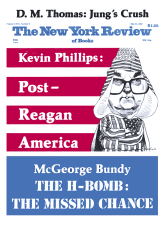In response to:
The Novelist as Pedagogue from the December 3, 1981 issue
To the Editors:
Not long ago John Bayley wrote in these pages, “Dostoevsky is one author about whom Nabokov can be of no use to us. He is too good at authors he loves to be of any help when he doesn’t love” [NYR, December 3]. Would that Bayley had pondered his own words before embarking on his long and futile attack on Wordsworth as poet, husband, friend, lover, and “comically familial human being” [NYR, February 18]. Where Nabokov at least gave some reasons (summarily dismissed as “not criticism”) for not thinking Dostoevsky among the very greatest writers, Bayley merely issues pronouncements: “Wordsworth’s poems are like ones’ parents’ clothes—always out of fashion”; Wordsworth’s mind is “irremediably dated,” and so forth.
The reviewer’s unrelenting animus is never more conspicuous than when combined with insufficient knowledge of the subject. Thus Wordsworth’s reference to “reading at Lamb’s the Tintern abbey” provokes this assault: “Who but Wordsworth would have talked about his own poem as ‘the Tintern abbey’ in this way—that definite article is unmistakably characteristic—and what other poet would linger with such unabashed fondness on a poem he had written many years previously?…” The answer to both questions, for starters, is Coleridge, whom Bayley finds an altogether more attractive figure than his “morally and emotionally common-place” friend. Coleridge almost always referred to his own work in this way (“the Christabel,” “the Remorse”), and he was chanting “Kubla Khan” in London drawing rooms twenty years after it was written. When Bayley concludes that “Wordsworth has vanished utterly,” one thinks of that comforting graffiti: “God is dead. Nietzsche,” under which was written: “Nietzsche is dead. God.”
Norman Fruman
University of Minnesota
Minneapolis, Minnesota
John Bayley replies:
I honor Professor Fruman for leaping to Wordsworth’s defense. But was it really necessary? I think he misunderstood my intentions, which were certainly not to depreciate Wordsworth or his poetry but to express a view about their singularity, in relation to the modern consciousness. What Matthew Arnold called “Wordsworth’s healing power” does depend—perhaps always did so—on his distance from us. His art “calms and soothes us” by the contemplation of something very much not ourselves. For most of us he and his poetry seem a long way away, “like clouds that rake the mountain summits”; and his letters to his wife, for all their fascination, do not bring him any closer. That was the general thesis in my review, and I am sorry if I failed to make it clear to Professor Fruman.
This Issue
May 13, 1982



